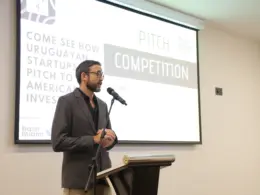How a small, smart logistics company entered U.S. and global markets
By Yousra Benkirane

The web of challenges that international expansion presents often leaves even the most seasoned entrepreneurs grappling for effective strategies. Programs and agencies for start-ups emerge as beacons of guidance and support for expansion. By understanding the intricacies of different markets, support agencies can offer insights, provide guidance, and arrange crucial connections. In essence, governmental and private non-profit programs pave the way for international growth by local start-ups.
Enter Eyal Shats, co-founder and chief strategy officer at SimpliRoute. A Chilean native, Shats started his smart logistics company in Chile in 2014, hoping to eventually expand beyond domestic borders. The use of such facilitators has been crucial for his company’s entry into the U.S. market.
SimpliRoute is a route optimization firm for both small businesses and big-name customers like Walmart, helping manage delivery routes using an algorithm engine that offers a range of features such as route planning, real-time tracking, vehicle and resource management, analytics, and reporting. Their value proposition is to make the delivery chain more efficient and cost-effective.
SimpliRoute took advantage of several start-up programs, such as Chile’s economic development agency CORFO and Startup Chile. Shats says this helped prepare him for the realities of global expansion, because, as he says, “The vision was always going global.” The programs also provided a platform to raise some initial capital, after which SimpliRoute was selected to participate in the 500 Startups Program in Silicon Valley for a year. When exposed to the multi-faceted world of international markets through the 500 program, the company began its plan to expand. By 2017, SimpliRoute had 120 employees and had opened offices in Mexico, Argentina, Colombia, Peru, and Paraguay (Brazil would come later). The goal was to target LatAm first, before expanding to other regions.
Three years later (2020), SimpliRoute raised a Series A investment round of $3 million, which was backed by Miami-based TheVentureCity, a global early-stage venture fund. To further the company’s international presence, Shats met with different investors in the U.S. but found it difficult to interest them in the LatAm region. “But TheVentureCity is different because they are looking for talent everywhere, not just in the U.S.,” explains Shats. “We wanted to expand our networking and also enter the U.S., so it was a perfect fit.” Last year, SimpliRoute raised another $8 million to support its growth in North America and is now focusing on expanding their services across the U.S. in states like Florida, Texas, and Colorado.
Shats, who moved to Miami earlier this year, is leading the charge for further U.S. expansion. “As I’m building our network here [in Miami], we are also leveraging our big clients, like the corporate and enterprise clients we have in LatAm. For example, we have Walmart in Chile, Central America, and Mexico. So, we are leveraging these kinds of clients to work with them in the U.S.” They used a similar strategy in LatAm. “We acquired many [small] customers to be able to develop our algorithm, and then we went to an enterprise solution. After acquiring clients like Walmart and Falabella, a huge retailer in Chile, we then went to Mexico and Peru using the same customers to enter the new country,” says Shats. The startup’s software has now been used to complete more than 50 million deliveries for over 1,000 customers in 26 countries.
“One of the main reasons we moved here [Miami] was because of TheVentureCity and all the help and support we had gotten,” says Shats. “As they always say, ‘There’s no zip code for talent.’”












